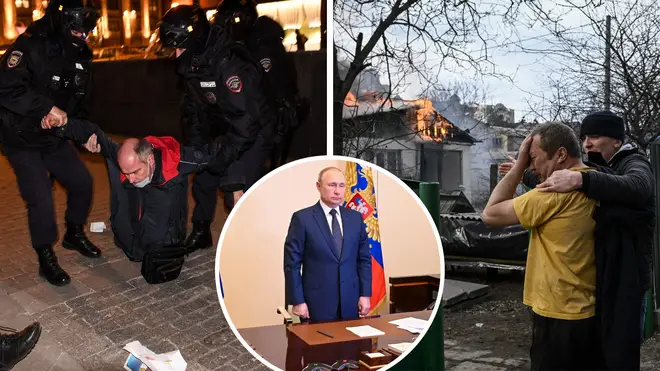
Iain Dale 7pm - 10pm
4 March 2022, 14:03 | Updated: 4 March 2022, 19:31

Russia has signed off a new law meaning citizens who spread "fake" information about the military can be jailed for up to 15 years.
But it comes at a time where the Kremlin has been accused of spreading propaganda about its invasion of Ukraine, refusing to acknowledge it is a "war" and imposing heavy crackdowns for those protesting against it.
Instead Russia insists the military is undertaking a "special operation" in Ukraine, with any suggestion otherwise likely to to be branded misinformation and therefore warrant an arrest.
So far Russia has restricted social media, banned some western news outlets and actively given classes about the so-called "liberation mission" in Ukraine.
The new law is the latest attempt to shield its citizens from the reality of the war in Ukraine.
Read more: World's biggest plane, An-225 Mryia, destroyed in attack on Hostomel airport
Read more: Zelenskyy calls for talks after Putin claims Ukraine is using civilians as ‘human shields’
On Friday Russia banned the country's BBC News website, according to German public broadcaster Deutsche Welle, after the Kremlin accused the corporation of playing a "determined role in undermining the Russian stability and security".
The broadcaster said it had seen an increase in traffic to its Russian language news website since the invasion of Ukraine began.
On Friday the BBC News Technology Twitter account shared a link to an article reminding viewers that its Ukrainian and Russian language services are available on the dark web.
Facebook has also been blocked, with Russia's Roskomnadzor saying the move followed what it described as restricted access to the country's media on the platform.
Nick Clegg, the former deputy prime minister and now director of global affairs at the platform's parent company Meta, said Russians were now cut off from reliable information.
On the Russian government's decision to block access to Facebook in the Russian Federation: pic.twitter.com/JlJwIu1t9K
— Nick Clegg (@nickclegg) March 4, 2022

Footage shows moment Zaporizhzhia nuclear power plant comes under attack
State news outlets in Russia have been heavily criticised by UK regulator Ofcom.
The watchdog opened 27 investigations into the "due impartiality" of programmes broadcast on the Kremlin-backed RT news channel, formerly known as Russia Today.
Russian state media downplays or ignores the destruction in major Ukrainian cities, civilian deaths and the significant loss of Russian troops.
Read more: PM says Putin 'threatens Europe's safety' as Russians seize Ukrainian nuclear plant
Read more: Zelenskyy 'survived three assassination attempts' since Russian invasion
It instead gives the impression the country's presence is limited to protecting Russian-speaking regions while insisting anything contradicting this narrative is fake news being spread by the West.
Pro-Kremlin Russian TV stations loyally repeat Mr Putin's propaganda that the invasion is a "special operation to defend the people's republics" and Russia is not the aggressor, while astonishingly accusing Ukraine of war crimes against its own citizens.

Putin's 40-mile military convoy approaching Kyiv is going to 'turn into a rubble heap'
Independent Russia-based news outlets are also being shut down pr heavily censored, with the country's leading independent radio station, Echo of Moscow, and the website of independent streaming channel TV Rain both blocked from reporting on the war.
Read more: Oligarch found dead in Surrey mansion 'feared he was on Putin's hit list'
Read more: 'Find your geiger counter': Caller near Zaporizhzhia nuclear plant shaken by Russian attack
And on Thursday Russian children were given a virtual lesson on "why the liberation mission in Ukraine is a necessity", according to the country's education ministry, also known as the 'Ministry of Enlightenment'.
Viewers were taught "about the danger Nato represents to our country" and "why Russia stood up for the protection of the civilians of the Donetsk and Luhansk People's Republics", when the reality is far different.

Russian soldier holds two grenades in his hand to deter crowds from attacking him in Ukraine
Mr Putin's government has also been relentlessly cracking down on anti-war protests since the invasion began, with almost 7,000 people detained so far in as many as 50 cities, according to the human rights project OVD-Info.
Young children and an elderly woman who survived the siege of Leningrad in the Second World War are among those who have been arrested for taking part.